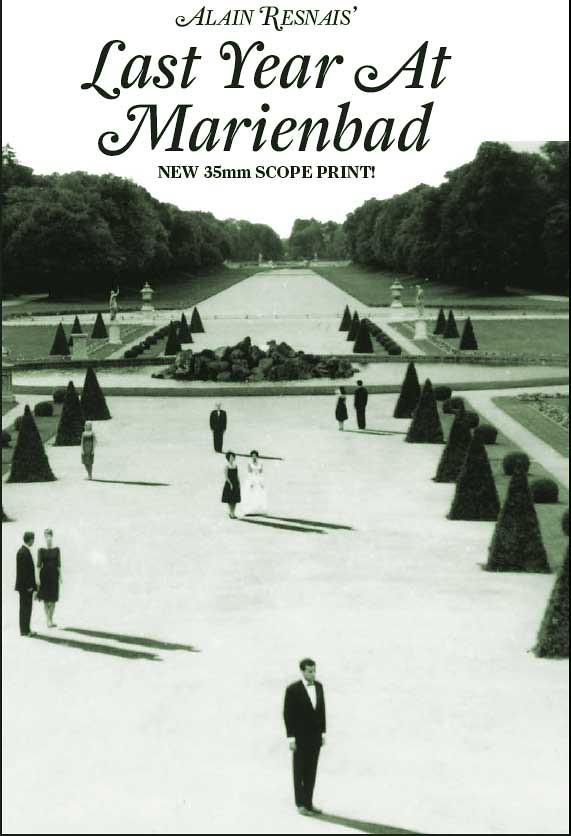
A couple of years ago my friend Myrrh introduced me to this long-neglected French classic. This morning was, I believe, the third time I've watched the film straight through, and maybe if you count up all the fragmented times I've seen parts of it, this may have been the fourth or even fifth time I've seen most scenes, and only now is it starting to cohere for me into something of a film experience. That is to say, now I feel like I can talk about it. Now I can make something of a theory or two about Last Year at Marienbad.
Obviously it plays out in a kind of "dreamlike" surreal atmosphere, none of it meant to feel naturalistic or exactly literal. In fact, all those silly parodies of black-and-white art films set around fountains and in statue gardens of bored aristocrats repeating nonsensical phrases and looking very posed that you see in TV shows, cartoons, perfume commercials... well, it's all right here. 8 1/2 a little bit, maybe, but mostly that all comes straight from this. But here (as in Fellini's film) all that easily-mockable repetition and stiffness is to a purpose. Like the film's main characters who cannot remember what happened where, I think we are meant to view Marienbad through the filter of faulty memory. The looped dialogue, the repeated imagery and cuts from one location to another mid-turn, the circular logic and endless disorienting architecture makes remembering what happened where, and in what order, almost impossible. You remember this film the way you remember a dream, unsure of the chronology, the characters, the relationships. He was coming to run away with her, and she wanted it, but also she didn't know him, and he might have been coming to attack her, but also she'd been murdered by a jealous husband, but that couldn't be, was she even married? This is how you describe dreams when you wake from them, eventually deciding on whatever elements resonated strongest and seem to recur most often in your memory of it, but you're never completely sure if you're remembering how it "was" in your dream, or how you want it to be when you wake. This isn't very different from remembering an idyllic (or emotionally volatile) vacation a year back, is it? Or a relationship from a while ago? You start piecing it together and you realize the chronology doesn't add up, or you left out the part where you were fighting on the bannister, and when you try to reinsert a remembered element into whatever fixed narrative you've made of your memories, the whole thing crumbles. You look at the pieces of memory, the fragments you're certain of, and the more you look the less you trust those, until everything becomes a kind of memory-kipple. I know no other film that better portrays the disorientation and fragmentation of remembering (a dream, the past, anything) than this.
There's one detail that always sticks with me and both illustrates and enriches this theme. I love the recurring part of the story with the husband, the man in black, named only M (the woman is A, the man chasing her, X) playing the matchstick game. It reminds our hero -- and us -- of a looming threat, a sense of doom, by telling us that there are nearly infinite iterations possible, but all of them end with the man in black winning. He always wins. You will always lose. You can remember it seven trillion different ways, but they all lead you right here, where you've lost whatever you're trying to regain through memory. No matter which matchsticks you grab for and in which order, the outcome is always the same.

No comments:
Post a Comment